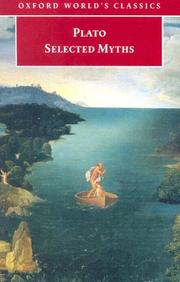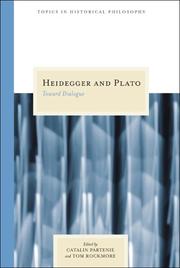| Listing 1 - 9 of 9 |
Sort by
|
Book
ISBN: 9780521887908 0521887909 Year: 2009 Publisher: Cambridge: Cambridge university press,
Abstract | Keywords | Export | Availability | Bookmark
 Loading...
Loading...Choose an application
- Reference Manager
- EndNote
- RefWorks (Direct export to RefWorks)
Myth. --- Mythology. --- Mythe --- Mythologie --- Plato. --- Myth --- Mythology --- Myths --- Legends --- Religion --- Religions --- Folklore --- Gods --- Demythologization --- God --- Aflāṭūn --- Aplaton --- Bolatu --- Platon, --- Platonas --- Platone --- Po-la-tʻu --- Pʻŭllatʻo --- Pʻŭllatʻon --- Pʻuratʻon --- Πλάτων --- אפלטון --- פלאטא --- פלאטאן --- פלאטו --- أفلاطون --- 柏拉圖 --- 플라톤 --- Plato --- Platon --- Platoon --- Платон --- プラトン --- Platon (0427?-0348? av. j.-c.)
Book
ISBN: 9781107404076 110740407X Year: 2011 Publisher: Cambridge, UK : Cambridge Univ Press,
Abstract | Keywords | Export | Availability | Bookmark
 Loading...
Loading...Choose an application
- Reference Manager
- EndNote
- RefWorks (Direct export to RefWorks)
Mythe. --- Mythologie. --- Platon.

ISBN: 019187535X 1280752904 0191517100 1429421495 9780191517105 9780192805089 0192805088 9781429421492 9786610752904 6610752907 0192805088 9781280752902 Year: 2004 Publisher: Oxford ; New York : Oxford University Press,
Abstract | Keywords | Export | Availability | Bookmark
 Loading...
Loading...Choose an application
- Reference Manager
- EndNote
- RefWorks (Direct export to RefWorks)
This volume brings together ten of the most celebrated Platonic myths, from eight of Plato's dialogues ranging from the early Protagoras and Gorgias to the late Timaeus and Critias. They include the famous myth of the cave from Republic as well as 'The Judgement of Souls' and 'The Birth of Love'. Each myth is a self-contained story, prefaced by a short explanatory note, while the introduction considers Plato's use of myth and. imagery. - ;'Once upon a time there were just the gods; mortal beings did not yet exist.'. We are used to thinking of myths as stories, and modern myths as made up and f
Mythology, Greek. --- Greek mythology --- Mythology [Greek ]
Book
ISBN: 9780199552559 019955255X Year: 2009 Publisher: Oxford : Oxford university press,
Abstract | Keywords | Export | Availability | Bookmark
 Loading...
Loading...Choose an application
- Reference Manager
- EndNote
- RefWorks (Direct export to RefWorks)
Overview: "Once upon a time there were just the gods; mortal beings did not yet exist." We are used to thinking of myths containing lines like this simply as stories, and modern myths as made up and fictitious. For the ancient Greeks, however, a myth was unveiled reality, and for Plato, who was a myth-maker as well as a myth-teller, a myth could tell us something important about ourselves and our world. The ultimate purpose of Plato's myths is to help us live a better life, and to teach philosophical truths in a form we can most easily understand. This volume brings together ten of the most celebrated Platonic myths from eight of Plato's dialogues, ranging from the early Protagoras and Gorgias to the later Timaeus and Critias. The collection includes the famous myth of the cave from Republic as well as "The Judgement of Souls" and "The Birth of Love." Each myth is a self-contained story, prefaced by a short explanatory note. An introduction to the volume considers Plato's use of myth and imagery. These myths are both thought-provoking and profound, and together they provide an ideal introduction to Plato's philosophy.

ISBN: 0810122332 Year: 2005 Publisher: Evanston Northwestern university press
Abstract | Keywords | Export | Availability | Bookmark
 Loading...
Loading...Choose an application
- Reference Manager
- EndNote
- RefWorks (Direct export to RefWorks)
Book
ISBN: 0810161885 Year: 2005 Publisher: Evanston, Ill. : Northwestern University Press,
Abstract | Keywords | Export | Availability | Bookmark
 Loading...
Loading...Choose an application
- Reference Manager
- EndNote
- RefWorks (Direct export to RefWorks)
Digital
ISBN: 9783319428536 9783319428543 Year: 2017 Publisher: Cham Springer
Abstract | Keywords | Export | Availability | Bookmark
 Loading...
Loading...Choose an application
- Reference Manager
- EndNote
- RefWorks (Direct export to RefWorks)
This book contains twelve engaging philosophical lectures given by Alexandru Dragomir, most of them given during Romania’s Communist regime. The lectures deal with a diverse range of topics, such as the function of the question, self-deception, banalities with a metaphysical dimension, and how the world we live in has been shaped by the intellect. Among the thinkers discussed in these lectures are Anaxagoras, Socrates, Plato, Aristotle, Descartes, and Nietzsche. Alexandru Dragomir was a Romanian philosopher born in 1916. After studying law and philosophy at the University of Bucharest (1933–1939), he left Romania to study for a doctorate in philosophy in Freiburg, Germany, under Martin Heidegger. He stayed in Freiburg for two years (1941–1943), but before defending his dissertation he was called back to Romania for military service and sent to the front. After 1948, historical circumstances forced him to become a clandestine philosopher: he was known only within a very limited circle. He died in 2002 without ever publishing anything. It was only after his death that Dragomir's notebooks came to light. His work has been published posthumously in five volumes by Humanitas, Bucharest; the present volume is the first to appear in English translation. In 2009, the Alexandru Dragomir Institute for Philosophy was founded in Bucharest as an independent research institute under the auspices of the Romanian Society for Phenomenology.
Metaphysics --- Theory of knowledge --- communisme
Book
ISSN: 00791350 ISBN: 9783319428536 9783319428543 3319428535 3319428543 Year: 2017 Volume: 220 Publisher: Cham: Springer,
Abstract | Keywords | Export | Availability | Bookmark
 Loading...
Loading...Choose an application
- Reference Manager
- EndNote
- RefWorks (Direct export to RefWorks)
This book contains twelve engaging philosophical lectures given by Alexandru Dragomir, most of them given during Romania's Communist regime. The lectures deal with a diverse range of topics, such as the function of the question, self-deception, banalities with a metaphysical dimension, and how the world we live in has been shaped by the intellect. Among the thinkers discussed in these lectures are Anaxagoras, Socrates, Plato, Aristotle, Descartes, and Nietzsche. Alexandru Dragomir was a Romanian philosopher born in 1916. After studying law and philosophy at the University of Bucharest (1933-1939), he left Romania to study for a doctorate in philosophy in Freiburg, Germany, under Martin Heidegger. He stayed in Freiburg for two years (1941-1943), but before defending his dissertation he was called back to Romania for military service and sent to the front. After 1948, historical circumstances forced him to become a clandestine philosopher: he was known only within a very limited circle. He died in 2002 without ever publishing anything. It was only after his death that Dragomir's notebooks came to light. His work has been published posthumously in five volumes by Humanitas, Bucharest; the present volume is the first to appear in English translation. In 2009, the Alexandru Dragomir Institute for Philosophy was founded in Bucharest as an independent research institute under the auspices of the Romanian Society for Phenomenology.
Metaphysics --- Theory of knowledge --- communisme --- Philosophy, Ancient --- Phenomenology --- Philosophy --- Dragomir, Alexandru, --- Philosophy. --- Academic collection --- Phenomenology . --- Philosophy (General). --- Philosophy, classical. --- Phenomenology. --- History of Philosophy. --- Classical Philosophy. --- Philosophy, Modern --- Philosophy, Ancient. --- Ancient philosophy --- Greek philosophy --- Philosophy, Greek --- Philosophy, Roman --- Roman philosophy --- Mental philosophy --- Humanities --- Dragomir, Alexandru, - 1916-2002 --- Ancient Philosophy / Classical Philosophy. --- History.
Digital

ISBN: 9783110664836 9783110662634 9783110662528 Year: 2019 Publisher: Berlin ;; Boston De Gruyter
Abstract | Keywords | Export | Availability | Bookmark
 Loading...
Loading...Choose an application
- Reference Manager
- EndNote
- RefWorks (Direct export to RefWorks)
| Listing 1 - 9 of 9 |
Sort by
|

 Search
Search Feedback
Feedback About UniCat
About UniCat  Help
Help News
News